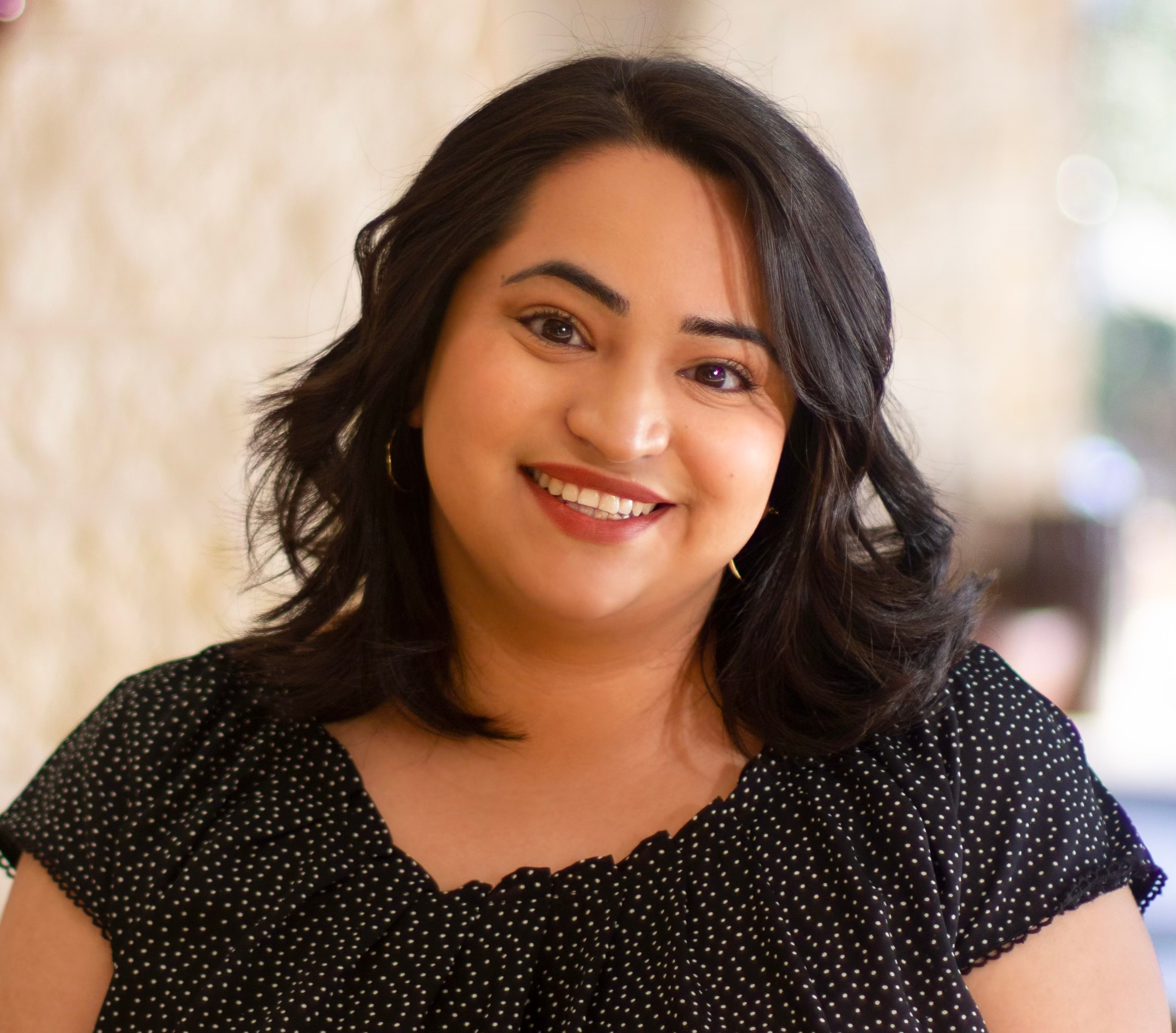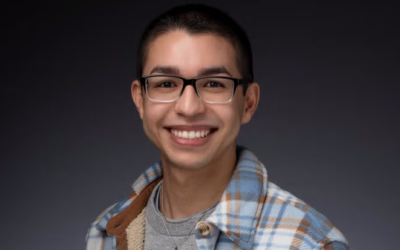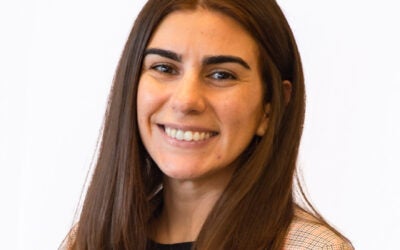Olivia Hinojosa Galvan, a doctoral student in the Counseling Psychology program at Our Lady of the Lake University has been selected to receive the 2024 Frances Fowler Wallace Memorial Award by the Hogg Foundation. The award will support research expenses for her work to understand how Latina psychology trainees and early career psychologists navigate and interpret gender and culture-based support networks within higher education and early professional contexts. By focusing on the lived experience of Latinas and based on the current literature, Olivia’s research will highlight the importance of culturally responsive approaches in psychology education, training, and practice.

Frances Fowler Wallace, the award’s namesake, was married to John Forsythe Wallace, a member of the Texas House of Representatives and the State Board of Control during the 1920s and 30s. Ms. Wallace died in Austin on July 18, 1972, at the age of 80. As directed in her will, the Wallace Award provides partial support for doctoral students’ dissertation research on “the cause, treatment, cure, and prevention of mental disease, mental illness, and mental disorders.” The award provides up to $3,000 for research-related expenses.
We spoke with Olivia about her research:
Tell us about yourself. At what point did you decide to pursue a career in mental health research, and what influenced that decision?
Mental health and wellness have always been a central focus in my life and have held different meanings for me over time. Growing up with two physicians as parents who were the first in my family to attend medical school, I learned the importance of service to others.
As I grew older, I started to take a deeper look into mental health and noticed the stigma and barriers to care that existed around mental health, especially in Latinx communities like mine. I also recognized the important role that helping professionals play in normalizing mental health care in their communities through both services and scholarship. That was when I realized my passion for psychology and my desire to study to become a psychologist.
Through this journey, I’ve come to learn the importance of understanding how gender and culture can shape an individual’s experiences with mental health, access to care, and the ways they seek support. This awareness continues to guide my commitment to culturally responsive care.
Your dissertation is titled, “Shared Strength: An Interpretative Phenomenological Analysis of Gender and Culture-Based Support Among Latina Psychology Trainees and Early Career Psychologists.” What questions are you trying to answer with this work?
Higher education can be an isolating experience for women of color, particularly given the historical exclusion of women from academic spaces. Often, Latinas in higher education find themselves as the only Latinx person in their academic circles, leading to heightened feelings of isolation and stress.
This study seeks to amplify the voices of Latina psychology trainees and Latina early career psychologists and explore the role of woman-to-woman support in the context of culture-based academic and professional familia (family).
My hope is that this research can add to the literature concerning the role of supportive social networks for Latinas and make heard the voices of Latinas in helping professions who may not be given the platform otherwise. Completing research on Latina psychology trainees and early career professionals can provide insight on the training needed to create a culturally responsive workforce that is reflective of and supports the mental health needs of diverse Latinx communities.
What led to your taking a professional interest in this particular topic?
My personal experiences navigating higher education as a Latina, paired with my experiences being provided immeasurable support throughout my graduate education from family, friends, and mentors, led me to be increasingly curious about the formation of culture and gender-based support in higher education. I’m interested in understanding what can be done to support Latinas in psychology and in other helping professions.
I’m fortunate to be part of a program at Our Lady of the Lake University that emphasizes cultural sensitivity, community, and collaboration. And growing up as an older sister to three younger sisters, I experienced firsthand the power of sisterhood. This foundation and interest in the integration of cultural values in higher education carried into my professional journey, where I am incredibly grateful to be a part of a cohort of five Latinas. Each demonstrates consideration and care, creating a sense of professional and personal sisterhood.
I learned very quickly the power of Latina support systems – of leaning on other women who shared cultural understandings and experience and rooting for each other’s success. Their support has been instrumental and indispensable in my journey to becoming a doctoral candidate.
How do you think your research methods and approach will help you to answer the questions that you’re posing?
Qualitative research methodologies align with my personal, cultural, and professional values. Especially after learning about liberation and feminist psychology and participatory action research, these frameworks encouraged me to view qualitative research approaches as methods that emphasize the importance of uplifting the voices of marginalized and minoritized communities.
Through an Interpretative Phenomenological Analysis, I’m eager to gather the testimonios (testimonies) of Latina psychology trainees and early career psychologists. This approach not only centers their lived experience but also allows us to learn directly from their narratives on how to foster supportive networks in academic and professional settings.
By highlighting these voices, we can identify solutions towards creating a more culturally attuned field of mental health care. This research can contribute to greater gender and cultural awareness across helping professions and influence systemic change.
Are there any suggested readings you can recommend for those who might be interested in learning more about this topic?
Absolutely! Reading for my dissertation research has been my favorite aspect of this process. I have truly felt connected to some of these authors who speak about their personal and professional experiences as Latinas in higher education. Here are a few of my recommendations:
- Anzaldúa, G. (2012). Borderlands: la frontera: the new Mestiza (4th edition 25th Anniversary edition Includes bibliographical references (p. [287]-300)). Aunt Lute Books
- Bryant-Davis, T., & Comas-Díaz, L. (2016). Womanist and mujerista psychologies: voices of fire, acts of courage. American Psychological Association.
- Cutri, R. M., Bernal, D. D., Powell, A., & Wiedeman, C. R. (1998). “An Honorable Sisterhood:” Developing a Critical Ethic of Care in Higher Education. Transformations: The Journal of Inclusive Scholarship and Pedagogy, 9(2), 100–117.
- Gonzales, S. M. (2019). Cultivating familismo: belonging and inclusion in one Latina/o learning community. International Journal of Inclusive Education, 23(9), 937–949.
2025 Francis Fowler Wallace Memorial Award: Miguel (Mickey) Garcia
Miguel (Mickey) Garcia, a doctoral candidate in the general psychology program with a concentration in health psychology at the University of Texas at El Paso has been selected to receive the 2025 Frances Fowler Wallace Memorial Award by the Hogg Foundation.
2024 Frances Fowler Wallace Memorial Award: Rebecca Jewell
Rebecca Jewell, a doctoral candidate in the clinical psychology program at the University of Houston, has been selected to receive the 2024 Frances Fowler Wallace Memorial for Mental Health award by the Hogg Foundation.
Work-life balance and burnout in marriage and family therapists
Mary Hannah Key explores current burnout symptoms of marriage and family therapists and how the experience of burnout impacts their ability to take care of themselves.
Caring for Our Caregivers: A Musical Approach
Mental health interventions that combine music and storytelling might improve caregiver well-being.
How Transportation Affects the Mental Health of Nursing Home Residents
A conversation with Wallace Memorial Award winner Vivian Miller.
Supporting Mental Health Research for Texas Doctoral Students
The Hogg Foundation is expanding eligibility for the Frances Fowler Wallace Memorial Award to include doctoral students at all institutions of higher education in Texas. Applicants must be pursuing a PhD in nursing, psychology, social work or another field relevant to...



